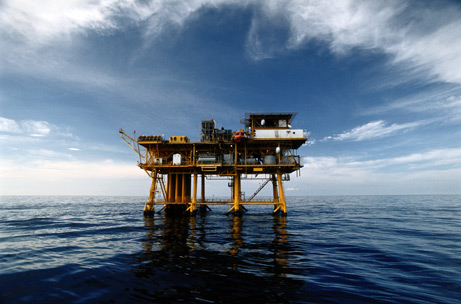
| Tuesday, September 06, 2011 | Archives | Advertise | Online Buyer's Guide | FLEETSolutions |
First Offshore Oil Leases For Sale Since BP Disaster
 The Interior Department announced on August 19 that it had scheduled its first sale of offshore oil leases in the Gulf of Mexico since the Deepwater Horizon disaster in 2010. But it is changing some of the rules to ensure that leased parcels are actually drilled and not hoarded. The Interior Department announced on August 19 that it had scheduled its first sale of offshore oil leases in the Gulf of Mexico since the Deepwater Horizon disaster in 2010. But it is changing some of the rules to ensure that leased parcels are actually drilled and not hoarded.President Obama's relations with the oil industry have suffered since the BP spill, with many executives accusing him of choking off domestic petroleum supplies and suppressing job creation. But it is unclear whether the resumption of lease sales will affect the rate of oil production in the gulf or improve relations. The department said that it was more than doubling the minimum bid for the right to drill in deep water in the gulf, to $100 an acre from $37.50 an acre in the proposed sale, which is scheduled for December 14. The auction encompasses more than twenty million acres of the western gulf. Officials said the change was based on an analysis of the last fifteen years of lease sales in the gulf, which found that leases that received high bids of less than $100 per acre have experienced virtually no exploration and development. The American Petroleum Institute said it was pleased to see the lease sale going forward but questioned the rationale for raising the minimum bid. "We are hopeful that this does not discourage investment in these vital domestic resources," said Erik Milito, a senior official at the petroleum lobby. Resuming leasing fulfills a promise President Obama made earlier this year to encourage more domestic oil and gas exploration in the gulf, off the shores of Alaska, and in the Atlantic. The Interior Department also granted tentative approval to Royal Dutch Shell to drill in the Arctic Ocean starting next year. Administration officials have complained that billions of barrels of domestic oil have gone untapped because oil companies have locked up millions of acres both onshore and offshore at bargain prices but have failed to develop the resources. The gulf sale will be the first in twenty-one months, avoiding making 2011 the first year since 1958 that a lease sale has not been held. It will be the first sale in the part of the gulf bordering Texas since the summer of 2009 and the first sale of any kind in the gulf since March 2010. President Obama suspended leasing in the gulf after the Deepwater Horizon accident in April 2010, which killed eleven workers and spilled an estimated 4.9 million barrels of oil into the gulf. In May he said that lease sales would resume this year but that all drilling would be conducted under stricter environmental and safety regulations. Ken Salazar, the Interior Secretary, said the agency was comfortable with resuming large-scale deepwater operations in the gulf because rigorous new standards were now in place. "This sale is an important step toward a secure energy future that includes safe, environmentally sound development of our domestic energy resources," he said in a statement. "Since Deepwater Horizon, we have strengthened oversight at every stage of the oil and gas development process, including deepwater drilling safety, subsea blowout containment, and spill response capability. "Exploration and development of our western gulf's vital energy resources will continue to help power our nation and drive our economy," he added. The lease offering includes parcels from nine to 250 miles offshore and in water depths from sixteen to nearly 11,000 feet. The Interior Department estimates that the tract could produce 222 million to 423 million barrels of oil and 1.49 trillion to 2.65 trillion cubic feet of natural gas. The Bureau of Ocean Energy Management, Regulation, and Enforcement is raising the minimum bid on leases in water deeper than 1,312 feet to encourage companies to actively explore those areas and to compensate for the high costs of dealing with a spill. Regulators said they concluded that raising the minimum bid would discourage companies from purchasing leases and then sitting on them for years. The regulatory bureau "is proposing this increase in an effort to ensure that areas with the greatest resource potential are developed, and to decrease the amount of leased acreage that is warehoused and goes unexplored," said Michael R. Bromwich, Director of the regulatory agency. Officials said they could not yet gauge industry interest in the parcels to be offered. Nor could they estimate how much money the government would reap from the auction, known as lease sale 218. The last western gulf sale, held in August 2009, covered 18.4 million acres and brought in $111 million. The last lease sale before the BP blowout and spill was for the central Gulf of Mexico in March 2010. It covered almost thirty-seven million acres and yielded $920 million. Some environmentalists said it was too soon after the BP disaster to resume large-scale leasing and drilling in the gulf and urged the government to delay the announced sale. "Rushing this lease sale puts marine ecosystems at risk before the ink is even dry on the impacts of the BP spill," said Jacqueline Savitz of the international conservation group Oceana. She added that the ocean energy bureau "appears to be caving to intense pressure from the oil industry to return to ‘business as usual,' without regard for the extraordinary risks to already imperiled marine animals." |
 |
NAFA Fleet Management Association 125 Village Blvd., Suite 200 Princeton, NJ 08540 Telephone: 609.720.0882 Fax: 609.452.8004 |






